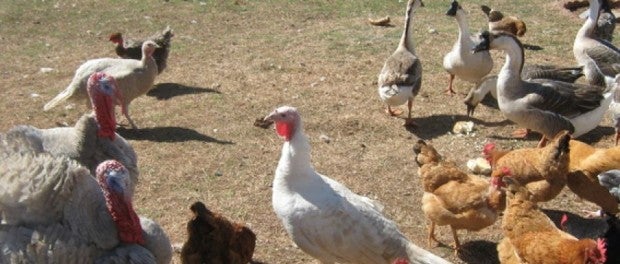The Best Barnyard Bird to Raise on Your Farm

There are many options for a good meat bird around the farm, but which is best for you? In truth, all poultry animals have their own set of pros and cons, so the answer to that depends in large part on how you’re set up and what you can manage in terms of care. Depending on the bird you choose, you could be relaxing while they do their own mothering or you may have to step in and do a lot of the baby raising yourself. Additionally, you may find yourself designing a predator-proof coop or providing a makeshift pond. It all comes down to personal preference and the barnyard bird you like the best. Here are some things to consider.
With Thanksgiving rapidly approaching, it is hard not to think about having turkeys on the farm. Although a turkey on the table makes for a delicious feast, getting that bird there could take some work. Turkeys, even heritage breeds, are not always the most dedicated to hatching their own eggs. Sure, the eggs can be incubated, but your job as surrogate turkey parent does not end there. Poults are very susceptible to coccidia, so you will need to make it a point to keep things shipshape at all times in order to hopefully prevent this. Beyond that, turkey chicks will still need a lot of care to keep them safe because they face many dangers as they grow, one of which is sadly that they are not always able to stop themselves from drowning in their own waterers. On the bright side, however, provided that you raise heritage breeds, those birds will be able to fly and avoid predation from the ground, so eventually they will be at least somewhat able to fend for themselves.
Geese and ducks fall into the same maintenance category and are a good choice for a meat bird for several reasons. First of all, they are pretty self-sufficient and low maintenance. They also do very well on minimal amounts of feed provided they have adequate space to forage. Heritage breeds in particular are advantageous as they have retained an ability to fly and can often evade ground predators whereas non-heritage breeds cannot always say the same. Additionally, heritage breeds are more likely to sit on and hatch their own eggs in most cases, also doing so several times annually which will keep your numbers increasing. The biggest downside to geese and ducks, however, is that they are incredibly messy and leave droppings wherever they go. They are also voracious eaters, devouring anything and everything to which they have access. It is necessary that they have access to a pond or some sort of body of water, even if only a kiddie pool, to keep mucus membranes moist and to maintain oil glands. This is vital to their health and well-being and cannot be overlooked.
Chickens have a reputation for being an easy bird to raise and that is mostly true. The kicker with cluckers is that they are typically either meat birds or egg layers. Depending on your ultimate goal, you want to select a bird that suits that purpose. This is important because egg laying birds are slower to mature than meat birds and even then, egg layers will be much leaner while meat birds are often too heavy to live long enough to really reproduce. It is, however, possible to get a dual-purpose bird if you would like the best of both worlds but you will have to make that determination. Predation is a real issue for chickens as a whole, but especially meat birds as they cannot fly. Thus, safe housing needs to be provided such as via a confinement to a coop at night. Like turkeys, chickens are also susceptible to coccidia and require clean living quarters to combat this, although there is a vaccine available. A benefit to choosing chickens is that feeding them is relatively inexpensive. Provided they are allowed to free range, most will gladly fill up on bugs and largely ignore the feed bowl, saving you money in the process.
The ultimate choice regarding which bird is best for your farm is going to come down to the one that fits best with your current operation. You may find that all three of them do or that one in particular is the way to go. Since farming is naturally demanding, you don’t necessarily want to bite off more than you can chew by adding high maintenance birds to the equation as that could cause another area of your operation to suffer. Instead it is important to choose a bird with a commitment level you can handle, thereby making it the best barnyard bird to raise on your for your farm.




 Your Privacy Choices
Your Privacy Choices
Leave a comment